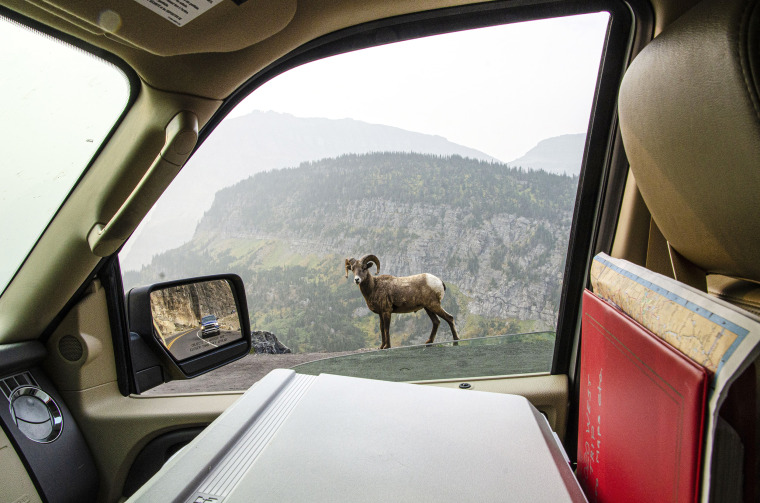The National Park Service plans to close its parks and furlough park rangers if the government shuts down as expected Sunday, a move that would spoil vacation plans for tens of thousands of people and put some gateway towns in an economic chokehold as long as the impasse in Congress lasts.
The park service plans to restrict access to parks as much as possible, shuttering visitor centers, locking gates and bolting bathrooms, a senior Interior Department official said.
Areas where restrictions are difficult, such as the National Mall or some trailheads, would remain open to the public, but trash collection, emergency response and other services wouldn't be guaranteed.
The decision once again puts the country’s 425 park sites — one of the most tangible and visible ways people interact with the federal government — at the center of the political tug-of-war over the budget. A shutdown would have significant economic impacts, hamper scientific research and even halt Fat Bear Week, a whimsical annual bracket competition scheduled to begin Wednesday that tracks Alaskan bears’ feeding progress.
Business leaders in gateway communities said they were bracing for the economic blow.
“We’ve had seven cancellations for this weekend,” said Clare Bingham, the owner of a private touring company called At Your Service Tours, which takes visitors through Acadia National Park in Maine.
Bingham, whose company features 10 vans and guide vehicles, said the first three weeks of October are peak season for her company as visitors flock to the park to see colorful fall leaves.
“We have a very short season from May to October, and taking three very sold-out weeks out of the equation, it’s going to be an impact,” she said.
Stephanie Clement, the vice president of conservation for Friends of Acadia, a nonprofit group that supports stewardship in the park, said people spend an average of $121 during visits, citing park service data. In October, more than 14,300 people visit every day, on average.
The National Parks Conservation Alliance, an independent nonprofit advocacy group for parks, said gateway communities across the U.S. stand to lose about $70 million in revenue each day the park system remains shuttered.
We’d like to hear from you about how you’re preparing for a possible government shutdown, whether you might be out of work or feel the effects of shuttered services. Please contact us at tips@nbcuni.com or reach out to us here.
It would be the fourth closure of the national parks in a decade because of government shutdowns.
During the longest two shutdowns, in 2013 and in winter 2018-19, about 7 of 8 federal National Park Service workers were furloughed, leaving about 3,000 people on a skeleton crew staff, according to a report from the Congressional Research Service.
In 2013, during the Obama administration, Interior Department officials enforced a full closure similar to the plan now. That shutdown lasted 16 days. In the winter of 2018-19, the government shut down for 35 days. The Trump administration allowed parks to remain partly open and used entrance fees for trash collection, sanitation and maintenance, which the Government Accountability Office later determined was a violation of the law.
In a recent letter, Sen. John Barrasso, R-Wyo., urged Interior Secretary Deb Haaland to keep parks open using entrance fees.
Others have said it’s legally fraught and not worth the risk.
“Leaving parks open or partially open with fees is not only legally very questionable but reckless, and leaving parks open to serious harm and threatens visitor safety,” said John Garder, the senior director of budget and appropriations at the National Parks Conservation Association.
“Even when parks are fully closed, there are still significant threats to resources, because there are only skeleton crews of staff, maybe as little as 10 to 15% of staff, there to maintain the most basic protection and operation of parks,” he said.
In 2018 and 2019, visitors damaged several sites, including Joshua Tree National Park in California, which had to be closed because motorists were creating new roads and destroying the park’s namesake trees. Other parks had issues with poaching, trash pileups, unsanitary bathrooms and vandalism.
During previous shutdowns, some state and local governments that depend on tourism generated by national parks stepped in to cover the costs of running them. However, Congress failed to reimburse the states, which might deter some from doing it again.
On Thursday, a spokesperson for Maine Gov. Janet Mills said she is considering tapping the state’s “rainy day fund” to cover federal programs that would be suspended during a shutdown, adding that part of her consideration is whether Washington would later pay Maine back.
The governors of Arizona and Utah said they would use state funds to help soften losses in their tourism industries, according to The Associated Press. The Interior Department official said the agency would discuss options with them.
All the scrambling has become tiresome for visitors and the people whose livelihoods depend on the parks.
In Maine, Bingham said her company would be forced to tour elsewhere and hope visitors continue to show up. She said she hoped to keep her 15 tour guides working as long as she could.
“It really depends on how long it lasts. They want to stay on, and hopefully we can create these out-of-the-park opportunities, but everyone is frightened,” she said, frustrated by the deadlock in Congress. “The last thing we need is the government working against us.”
